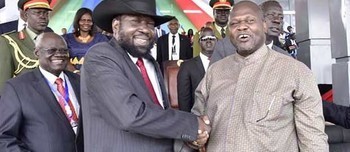Signatories to the South Sudan peace deal, political parties, and civil society have said that the Transitional Government of National Unity (TGoNU), also known as SPLM-IG, cannot unilaterally postpone elections without consulting them.
The political entities were reacting to a letter written last week by the Minister for Presidential Affairs, Nhial Deng Nhial, in which he said that it was not feasible to hold the scheduled elections in 2022 due to delays in implementing the provisions of the peace agreement.
“The call for early elections in 2022, is again without justification. It must be borne in mind that the actual inauguration of the (R-TGoNU) following the conclusion of the Agreement in September 2018 took some time,” Minister Nhial wrote. “Hence the time lost must be recouped so that there is adequate time to complete all the tasks of the transition before elections are held. Dr. Ajak himself would acknowledge the absolute necessity of first producing a Permanent Constitution and conducting a population census as indispensable pre-requisites to holding elections.”
The SPLM-IO’s head of information and public relations, Puok Both Baluang, described the announcement as a unilateral decision by the government. He says such a decision should be consulted among the parties to the agreement and voiced as a collective decision after deliberations and ratification by all.
“This agreement has given us all solutions to all our problems in South Sudan. If the guarantors, friends, and donors support us with resources, we can meet the datelines and conduct the election in time,” Both said.
Both said lack of resources for the implementation of the agreement has contributed negatively to delaying the implementation matrix and led to delays.
He urged all the parties to continue to implement the deal not to take the risk of a “premature move” to speak about postponing the election.
“Our people are now in need of peace and stability so we should all focus our efforts on how to implement this peace agreement. As the SPLM-IO, we are committed to continuing to fully implement the peace agreement rather than taking people to the election.”
Kornelio Kon, a member of the Other Political Parties (OPP), also a signatory to the agreement, said elections cannot be conducted without a constitution, a population census to determine geographic constituencies and a reconstituted national parliament.
Kon accused the SPLM-IG and the SPLM-IO of deliberately delaying the establishment of the transitional institutions as a tactic to postpone the elections.
“Once the formation of all structural government institutions in South Sudan is completed, the Hybrid Court is supposed to begin its work after six months and anyone found involved in committing atrocities during the war is supposed to resign and appear before the court. Who would like to appear before the court?” Kon asked.
He blamed the parties to the agreement of lacking the political will to implement the peace deal to the letter and called on the guarantors of the peace deal to step in to ensure that the peace is implemented.
The Executive Director of Women Action For and With Society, Betty Sunday, said as much as she agrees with the postponement of the elections due to delays, the peace partners should set clear timelines for the remaining provisions in the peace agreement.
“Postponing elections alone doesn’t solve any problem in the country,” Sunday cautioned.
“We have not conducted the national population census, we didn’t establish the National Elections Commission, we have the issue of insecurity across the country, we don’t have proper roads and some citizens are still in the refugee camps. How can the election be done?” She questioned.
Sunday stressed that South Sudanese would like to see a more serious commitment by all the parties to the agreement and a clear road map for the way forward.
Rajab Muhandis, the Executive Director of the Organization for Responsive Governance who also represents the civil society in the Reconstituted Joint Monitoring and Evaluation Commission (R-JMEC) criticized the unilateral announcement by the SPLM-IG to delay the election.
“This decision is supposed to be decided by all the parties, guarantors, regional and international partners to the peace agreement,” Muhandis said, “As leaders of this country, they are supposed to have a clear road map where this country is heading and how it should be governed, but we don’t see anything of that kind.”
“For nearly 30 months into the implementation of the revitalized peace agreement today, all that has been going on is the formation of the government at different levels and most of these formed institutions are not functioning,” he added.
Muhandis blamed the parties for wasting a lot of time disagreeing among themselves due to a lack of trust and goodwill.
According to the Revitalised Agreement on the Resolution of the Conflict in the Republic of South Sudan, 60 days before the end of the transitional period, the National Elections Commission shall organize elections under the provisions of the Permanent Constitution.




